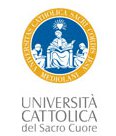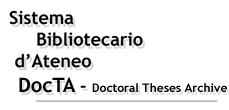|
|
DocTA - Doctoral Theses Archive >
Tesi di dottorato >
CORSO DI DOTTORATO IN SCIENZE DELLA PERSONA E DELLA FORMAZIONE >
Citazione:
Utilizza queste indicazioni per citare o creare un link a questo documento.
|
Serrano, Malaika. "EDUCATION ABROAD FOR ALL: MOVING BEYOND DEFICIT NARRATIVES AND AMPLIFYING THE VOICES OF HISTORICALLY MARGINALIZED STUDENTS", Università Cattolica del Sacro Cuore, XXXV ciclo, a.a. 2021/22, Milano, [http://hdl.handle.net/10280/161116].
|
| Titolo: | EDUCATION ABROAD FOR ALL: MOVING BEYOND DEFICIT NARRATIVES AND AMPLIFYING THE VOICES OF HISTORICALLY MARGINALIZED STUDENTS |
| Autore/i: | SERRANO, MALAIKA |
| Tutor: | JONES, ELSPETH
TRAN, LY |
| Coordinatore: | MARCHETTI, ANTONELLA |
| Lingua: | ENG |
| Abstract in italiano della tesi: | Per molte generazioni, le opportunità di studio all'estero sono state accessibili solo agli
studenti più privilegiati dell'istruzione superiore (Brewer & Ogden, 2018; Hoffa, 2007;
Mukherjee, 2012). Con il progressivo ingresso della società nel XXI secolo, il governo degli
Stati Uniti ha riconosciuto il valore dei programmi di mobilità internazionale degli studenti
(Contreras, 2015). Un numero crescente di istituti di istruzione superiore in tutto il mondo sta
incorporando lo studio all'estero nei propri piani di internazionalizzazione. Negli Stati Uniti,
sebbene siano stati fatti alcuni progressi nel numero effettivo di studenti che si recano all'estero,
la partecipazione degli studenti storicamente emarginati (ad esempio, gli studenti di colore)
rimane sproporzionatamente bassa rispetto alla rappresentanza complessiva nell'istruzione
superiore (Hanson, 2022; Institute of International Education, 2021; NAFSA, 2021).
Lo scopo di questo studio è stato quello di comprendere più a fondo le condizioni
istituzionali che sostengono od ostacolano la partecipazione a programmi di studio all'estero
degli studenti provenienti da comunità storicamente emarginate. Sebbene siano stati condotti
numerosi studi sulla scarsa partecipazione agli studi all'estero da quando la dottoressa Johnnetta
B. Cole, all'epoca presidente dello Spelman College, tenne un discorso avvincente alla
viii
conferenza del 1990 del Council on International Educational Exchange, l'attenzione si è
concentrata principalmente sulle caratteristiche individuali degli studenti (ad esempio, status
socioeconomico, studenti universitari di prima generazione) come causa di una minore
partecipazione agli studi all'estero. La motivazione dei tassi di partecipazione più bassi è stata
spiegata da una prospettiva di deficit (ad esempio, mancanza di mezzi finanziari o di sostegno
familiare). Questa prospettiva sminuisce la responsabilità degli amministratori istituzionali e dei
docenti nell'affrontare il problema.
Lo studio si è svolto presso la Rocky Mountain University (RMU),1 un'istituzione
d'istruzione superiore con classificazione R1 Carnegie (cioè ad alta intensità di ricerca e di
dottorato) negli Stati Uniti, con una lunga storia di formazione all'estero. Hanno preso parte allo
studio 22 partecipanti che si sono identificati come corrispondenti a uno o più criteri: (a) neri,
indigeni, persone di colore (BIPOC); (b) studenti universitari di prima generazione; (c) studenti
con elevate esigenze finanziarie; e/o (d) studenti in età matura. Tutti i partecipanti erano stati
accettati in un programma di studio all'estero. Questo progetto è unico nel suo genere poiché è
incentrato sulle esperienze di studenti emarginati che hanno fatto domanda e sono stati accettati
in un programma di studio all'estero e che si sono ritirati dopo l'accettazione o hanno studiato
all'estero. Questo particolare momento del ciclo di vita di uno studio all'estero è stato poco
studiato e rappresenta quindi una lacuna nella conoscenza collettiva del settore dell'istruzione
internazionale. Uno dei risultati dello studio è stata la creazione di domande guida e
raccomandazioni per la comunità dell'istruzione all'estero per ridurre i divari di equità
nell'istruzione all'estero e ampliare la partecipazione alla mobilità degli studenti |
| Abstract in inglese: | For generations, study abroad opportunities were only accessible to the most privileged
students in higher education (Brewer & Ogden, 2018; Hoffa, 2007; Mukherjee, 2012). As society
has moved into the 21st century, the U.S. government has recognized the value of funding
international student mobility programs (Contreras, 2015). An increasing number of higher
education institutions around the world are incorporating study abroad into their
internationalization plans. In the United States, although some gains have been made in the
actual numbers of students studying abroad, participation from historically marginalized students
(e.g., students of color) remains disproportionately low compared to overall representation in
higher education (Hanson, 2022; Institute of International Education, 2021; NAFSA, 2021).
The purpose of this study was to gain a deeper understanding of institutional conditions
that support or hinder study abroad participation for students from historically marginalized
communities. Although there have been a number of studies on underrepresentation in education
abroad since Dr. Johnnetta B. Cole, then president of Spelman College, gave a riveting address at
the 1990 Council on International Educational Exchange Conference, their focus has primarily
centered around individual student characteristics (e.g., socioeconomic status, first-generation
college student) as the reason for lower participation numbers. The rationale for lower
participation rates has been explained from a deficit perspective (e.g., lacking financial means or
not receiving family support). This perspective diminishes the responsibility of institutional
administrators and faculty in addressing the issue.
The study took place at Rocky Mountain University (RMU),1
a R1 Carnegie
Classification Institution of Higher Education (i.e., research intensive and doctoral granting
institution) in the United States, with a long-standing history of education abroad. A total of 22
participants took part in the study, who identified as meeting one or more criteria: (a) Black,
Indigenous, People of Color (BIPOC); (b) first-generation college student; (c) high financial
need student; and/or (d) mature-aged student. All participants had been accepted on a study
abroad program. This project was unique because it centered on the experiences of marginalized
students who applied and were accepted into a study abroad program and either withdrew post acceptance or did study abroad. This particular moment in time in the study abroad lifecycle has
been under researched; therefore, it represents a gap in the collective knowledge of the
international education field. An outcome of the study was the creation of guiding questions and
recommendations for the education abroad community to reduce equity gaps in education abroad
and widen participation in student mobility. |
| Data di discussione: | 28-giu-2023 |
| URI: | http://hdl.handle.net/10280/161116 |
| È visualizzato nelle collezioni: | CORSO DI DOTTORATO IN SCIENZE DELLA PERSONA E DELLA FORMAZIONE
FACOLTA' DI SCIENZE DELLA FORMAZIONE
|
File in questo documento:
| File |
Dimensioni | Formato | Accessibilità |
|---|
| Malaika Serrano Thesis.pdf | 1,46 MB | Adobe PDF | Visualizza/apri
|
|
Accesso e utilizzo dei contenuti di DocTA
|



